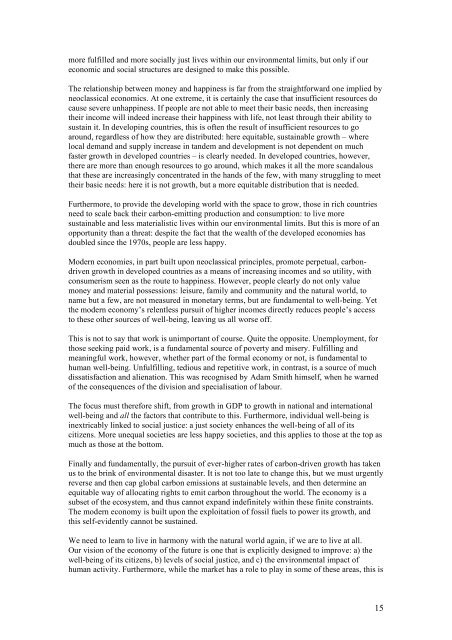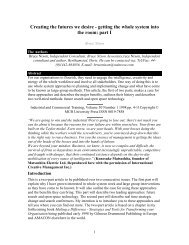From Old Economics to New Economics- Radical ... - Bruce Nixon
From Old Economics to New Economics- Radical ... - Bruce Nixon
From Old Economics to New Economics- Radical ... - Bruce Nixon
You also want an ePaper? Increase the reach of your titles
YUMPU automatically turns print PDFs into web optimized ePapers that Google loves.
more fulfilled and more socially just lives within our environmental limits, but only if our<br />
economic and social structures are designed <strong>to</strong> make this possible.<br />
The relationship between money and happiness is far from the straightforward one implied by<br />
neoclassical economics. At one extreme, it is certainly the case that insufficient resources do<br />
cause severe unhappiness. If people are not able <strong>to</strong> meet their basic needs, then increasing<br />
their income will indeed increase their happiness with life, not least through their ability <strong>to</strong><br />
sustain it. In developing countries, this is often the result of insufficient resources <strong>to</strong> go<br />
around, regardless of how they are distributed: here equitable, sustainable growth – where<br />
local demand and supply increase in tandem and development is not dependent on much<br />
faster growth in developed countries – is clearly needed. In developed countries, however,<br />
there are more than enough resources <strong>to</strong> go around, which makes it all the more scandalous<br />
that these are increasingly concentrated in the hands of the few, with many struggling <strong>to</strong> meet<br />
their basic needs: here it is not growth, but a more equitable distribution that is needed.<br />
Furthermore, <strong>to</strong> provide the developing world with the space <strong>to</strong> grow, those in rich countries<br />
need <strong>to</strong> scale back their carbon-emitting production and consumption: <strong>to</strong> live more<br />
sustainable and less materialistic lives within our environmental limits. But this is more of an<br />
opportunity than a threat: despite the fact that the wealth of the developed economies has<br />
doubled since the 1970s, people are less happy.<br />
Modern economies, in part built upon neoclassical principles, promote perpetual, carbondriven<br />
growth in developed countries as a means of increasing incomes and so utility, with<br />
consumerism seen as the route <strong>to</strong> happiness. However, people clearly do not only value<br />
money and material possessions: leisure, family and community and the natural world, <strong>to</strong><br />
name but a few, are not measured in monetary terms, but are fundamental <strong>to</strong> well-being. Yet<br />
the modern economy’s relentless pursuit of higher incomes directly reduces people’s access<br />
<strong>to</strong> these other sources of well-being, leaving us all worse off.<br />
This is not <strong>to</strong> say that work is unimportant of course. Quite the opposite. Unemployment, for<br />
those seeking paid work, is a fundamental source of poverty and misery. Fulfilling and<br />
meaningful work, however, whether part of the formal economy or not, is fundamental <strong>to</strong><br />
human well-being. Unfulfilling, tedious and repetitive work, in contrast, is a source of much<br />
dissatisfaction and alienation. This was recognised by Adam Smith himself, when he warned<br />
of the consequences of the division and specialisation of labour.<br />
The focus must therefore shift, from growth in GDP <strong>to</strong> growth in national and international<br />
well-being and all the fac<strong>to</strong>rs that contribute <strong>to</strong> this. Furthermore, individual well-being is<br />
inextricably linked <strong>to</strong> social justice: a just society enhances the well-being of all of its<br />
citizens. More unequal societies are less happy societies, and this applies <strong>to</strong> those at the <strong>to</strong>p as<br />
much as those at the bot<strong>to</strong>m.<br />
Finally and fundamentally, the pursuit of ever-higher rates of carbon-driven growth has taken<br />
us <strong>to</strong> the brink of environmental disaster. It is not <strong>to</strong>o late <strong>to</strong> change this, but we must urgently<br />
reverse and then cap global carbon emissions at sustainable levels, and then determine an<br />
equitable way of allocating rights <strong>to</strong> emit carbon throughout the world. The economy is a<br />
subset of the ecosystem, and thus cannot expand indefinitely within these finite constraints.<br />
The modern economy is built upon the exploitation of fossil fuels <strong>to</strong> power its growth, and<br />
this self-evidently cannot be sustained.<br />
We need <strong>to</strong> learn <strong>to</strong> live in harmony with the natural world again, if we are <strong>to</strong> live at all.<br />
Our vision of the economy of the future is one that is explicitly designed <strong>to</strong> improve: a) the<br />
well-being of its citizens, b) levels of social justice, and c) the environmental impact of<br />
human activity. Furthermore, while the market has a role <strong>to</strong> play in some of these areas, this is<br />
15



